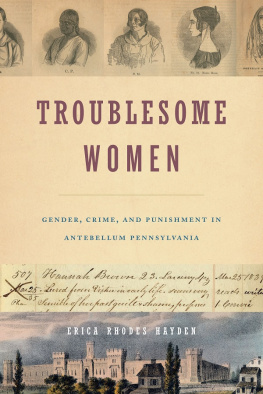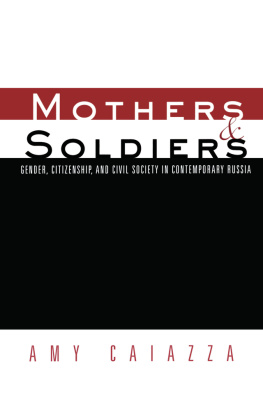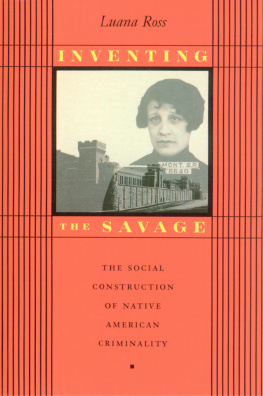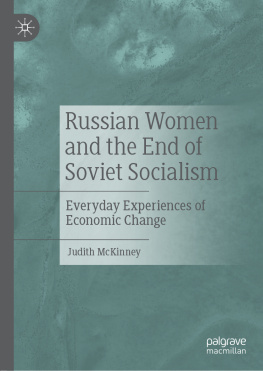
Judith Pallot is Professor Emeritus and Senior Research Fellow in Russian and East European Studies, University of Oxford and Christ Church (college), and Honorary Visiting Fellow, University of Leicester. Her interest in Russia spans four decades and she is the author of books and articles on Russian and Soviet rural society and the geography of punishment. She has commentated on Russia for the media including BBC Radio 4, Womans Hour, Radio Free Europe and the Guardian. Her most recent book, co-authored with Laura Piacentini, Gender, Geography and Punishment: The Experience of Women in Carceral Russia (2012) was awarded the Barbara Heldt Prize by the American Association for Women in Slavic Studies. She is currently President of the British Association for Slavonic and East European Studies.
Elena Katz is Honorary Research Associate, School of Geography and the Environment, University of Oxford and teaches in its Department of Continuing Education. She was previously Max Hayward Fellow at St Antony's College, University of Oxford, a senior researcher at the School of Geography, where she contributed to various projects on the Russian prison system, and has most recently collaborated with Judith Pallot on the AHRC-funded project upon which this book is based. She has published widely in Russian area studies, literary and cultural history and is the author of Neither with Them, Nor Without Them: The Russian Writer and the Jew in the Age of Realism (2008). She is currently collaborating with Laura Piacentini on a Leverhulme-funded project on rights consciousness among prisoners in Russia.
Waiting at the Prison gate offers an illuminating and sensitive discussion of the impact of incarceration in the Russian Federation's penal system on the relatives of prisoners. It vividly shows how secondary prisonisation requires women to redefine relationships, adapt their lives and develop strategies to deal with the stigma, pressures and anxieties that affect their self-identification. Revealing quotations illustrate how they make sense of their changing reality and give meaning to it, whether by justification, denial, avoidance, or a complex web of emotions. Excellently researched, this impressive and accessible book carries wide appeal.
Mary Buckley, Hughes Hall, University of Cambridge
This powerful and innovative contribution to the field focuses on the experiences of prisoners? wives and partners in contemporary Russia. The interviews with women prisoners-in-law on which this study is based empower these often marginalised women, and allow the reader to hear their voices directly. By taking the perspective of individuals operating at the margins of post-Soviet society, we are provided with unique insights into the lives of ordinary Russians, and into the position of women in Russia more broadly. We are also afforded access to the nature of prison sub-cultures and prisoners? experience of life behind bars.
Sarah Badcock, Department of History, University of Nottingham
WAITING AT THE
PRISON GATE
Women, Identity and the Russian Penal System
J UDITH P ALLOT AND E LENA K ATZ
Published in 2017 by
I.B.Tauris & Co. Ltd
London New York
www.ibtauris.com
Copyright 2017 Judith Pallot and Elena Katz
The right of Judith Pallot and Elena Katz to be identified as the authors of this work has been asserted by the authors in accordance with the Copyright, Designs and Patents Act 1988.
All rights reserved. Except for brief quotations in a review, this book, or any part thereof, may not be reproduced, stored in or introduced into a retrieval system, or transmitted, in any form or by any means, electronic, mechanical, photocopying, recording or otherwise, without the prior written permission of the publisher.
Every attempt has been made to gain permission for the use of the images in this book. Any omissions will be rectified in future editions.
References to websites were correct at the time of writing.
International Library of Human Geography 41
ISBN: 978 1 78453 660 2
eISBN: 978 1 78672 033 7
ePDF: 978 1 78673 033 6
A full CIP record for this book is available from the British Library
A full CIP record is available from the Library of Congress
Library of Congress Catalog Card Number: available
FIGURES
A typical morning in the priemnyi punkt in a Moscow sizo.
A mens strict regime correctional colony in Potma, Mordoviya. The western part of the republic is a more or less enclosed penal zone consisting of 17 correctional colonies and 11 villages.
A street in the settlement of Yavas the capital of the penal zone in a remote rural district of the Republic of Mordoviya. The blocks of modern flats are occupied by prison staff.
The imprisonment rate by region in the Russian Federation, 200814. The map demonstrates the export of prisoners from the central European part of the country to peripheral oblasts and republics in the European north, the Urals and Siberia.
Princess Mariya Volkonskaya, by Karl Bryullov, 1842.
The house in which Mariya Volkonskaya and Ekaterina Trubetskaya lived in Siberia to be near their husbands who had been condemned to forced labour in the Blagodatskii mine, Siberia (from Memoirs of Princess Volkonskaya, 1904, p. 89).
Open day at a strict regime correctional colony in the Volga-Urals region. After a programme of lectures and tours, visitors are finally allowed to meet up with their prisoner relatives in the detachment yard.
Information hatch in a Moscow remand prison. This is the place to which relatives have to come to confirm the location of a prisoner and for information about all aspects of staying in touch.
Talking on the intercom phone during a short visit at a correctional colony in Krasnoyarsk krai.
Notice in a remand prison informing relatives what clothes they can hand in for a prisoner. It reads: Citizen Relatives. Permitted Summer Clothes: base ball cap; wind jammer; polo neck jumper or sweater; tracksuit; shirt; shorts; summer shoes without arch supports; slippers or flip-flops; jeans or trousers; sweatshirts T-shirts. No winter clothes permitted.
Visiting a correctional colony. In this colony wives are allowed on open days into the dormitory where the prisoners sleep.
, accessed 27 June 2016).
Waiting.
Newlyweds. Correctional Colony Governors differ in how prepared they are to meet couples' preferences for the ceremony. Not all permit wedding cakes, as here, and the time the newly wed couple is allowed together after the ceremony varies widely.
A mother arriving at a Moscow remand prison with bags of produce to hand in for onward passage to her son.
Unpacking cigarettes for inspection by the prison authorities in the parcel reception point in a Moscow sizo.
Set lunches. This is a notice encouraging relatives to order meals for their relative within. It reads: Order set and supplementary meals in this remand prison. Healthy and good quality food. Good eating keeps people healthy: grilled chicken, baked products; pelmeni, pilaf, hallal. Your prisoners receive the order by lunchtime. Pay by credit card via the internet.







